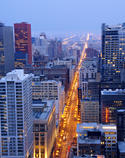A pending bill in Congress to reduce carbon emissions via a “cap and trade” regime would have significant distorting effects on America's regional economies. This is because the cost of compliance varies widely from region to region and metro to metro. This is all the more important since such legislation may do very little to reduce overall carbon emission according to two of the EPA's own San Francisco lawyers. read more »
Urban Issues
Reducing Carbon Should Not Distort Regional Economies
- Login to post comments
Bowling Alone or Bowling Along?
It has long been cultural sport to mock or to misunderstand the social life of suburbs. More recently, however, sport itself has been identified as a major arena for social decline in suburbia.
In his Bowling Alone, published with an almost apocalyptic sense of timing at the beginning of the present century, the esteemed social scientist Robert Putnam focused upon the decline of the American bowling leagues as symptomatic of a lost America. read more »
Obama Still Can Save His Presidency
A good friend of mine, a Democratic mayor here in California, describes the Obama administration as "Moveon.org run by the Chicago machine." This combination may have been good enough to beat John McCain in 2008, but it is proving a damned poor way to run a country or build a strong, effective political majority. And while the president's charismatic talent – and the lack of such among his opposition – may keep him in office, it will be largely as a kind of permanent lame duck unable to make any of the transformative changes he promised as a candidate. read more »
A Slow Job Recovery in Silicon Valley
Although job growth is gradually returning to Silicon Valley, don’t break out the champagne quite yet.
Lucia Mokres moved to the area five years ago. Last year, when she was working at a contract engineering and manufacturing firm, she saw several clients lose their jobs, as well as both large and small companies go under in the economic crunch. She remembers one conference vividly. While manning the event booth, instead of seeing people pitch work they had for her firm, they instead passed out resumes, asking her team for work. read more »
- Login to post comments
It's Crowded Out Here
Do you know that where I'm sitting right now, the population density is 2,787,840 people per square mile?
And here are two other numbers (from Wikipedia) that you shouldn't believe: The population density of Manhattan is 71,201/sq mi. And of Australia: 7.3/sq mi.
And now a number that might just be credible: Hong Kong has 2,346.1/sq mi.
My personal population density I got by allotting myself 10 square feet, and then extrapolating to a square mile. True, as far as it goes, but this must be what Mark Twain meant by "lies, damned lies, and statistics." read more »
Police Pensions and Voodoo Actuarials
A key argument that public-safety officials use to justify their absurdly high pension benefits –- i.e., “3 percent at 50” retirements that allow them to retire with 90 percent or more of their final year’s pay as early as age 50 -- is this: We die soon after retirement because of all the stresses and difficulties of our jobs. This is such a common urban legend that virtually every officer who contacts me mentions this “fact.” They never provide back-up evidence. read more »
Congress and the Administration Take Aim at Local Democracy
Local democracy has been a mainstay of the US political system. This is evident from the town hall governments in New England to the small towns that the majority of Americans choose to live in today.
In most states and metropolitan areas, substantial policy issues – such as zoning and land use decisions – are largely under the control of those who have a principal interest: local voters who actually live in the nation’s cities, towns, villages, townships and unincorporated county areas. This may be about to change. read more »
Detroit: Urban Laboratory and the New American Frontier
The troubles of Detroit are well-publicized. Its economy is in free fall, people are streaming for the exits, it has the worst racial polarization and city-suburb divide in America, its government is feckless and corrupt (though I should hasten to add that new Mayor Bing seems like a basically good guy and we ought to give him a chance), and its civic boosters, even ones that are extremely knowledgeable, refuse to acknowledge the depth of the problems, instead ginning up stats and anecdotes to prove all is not so bad. read more »
Getting Real About “Green” Jobs
Over the past year, Economic Modeling Specialists, Inc. (EMSI) has been fielding questions from local planners (workforce boards, community colleges, and economic developers) on how to look at green jobs, particularly at the regional level. Perhaps nothing has been more hyped, or misunderstood, than the potential impact of this sector on local economies.
In order to wade through the rhetoric and often overblown expectations, we’ve been doing our best to link labor market data to potential green sectors so people can gain an understanding of trends, earnings, education levels, and skills associated with “green occupation clusters”. So far, we have made three general observations: read more »
Numbers Don't Support Migration Exodus to "Cool Cities"
For the past decade a large coterie of pundits, prognosticators and their media camp followers have insisted that growth in America would be concentrated in places hip and cool, largely the bluish regions of the country.
Since the onset of the recession, which has hit many once-thriving Sun Belt hot spots, this chorus has grown bolder. The Wall Street Journal, for example, recently identified the "Next Youth-Magnet Cities" as drawn from the old "hip and cool" collection of yore: Seattle, Portland, Washington, New York and Austin, Texas. read more »






















